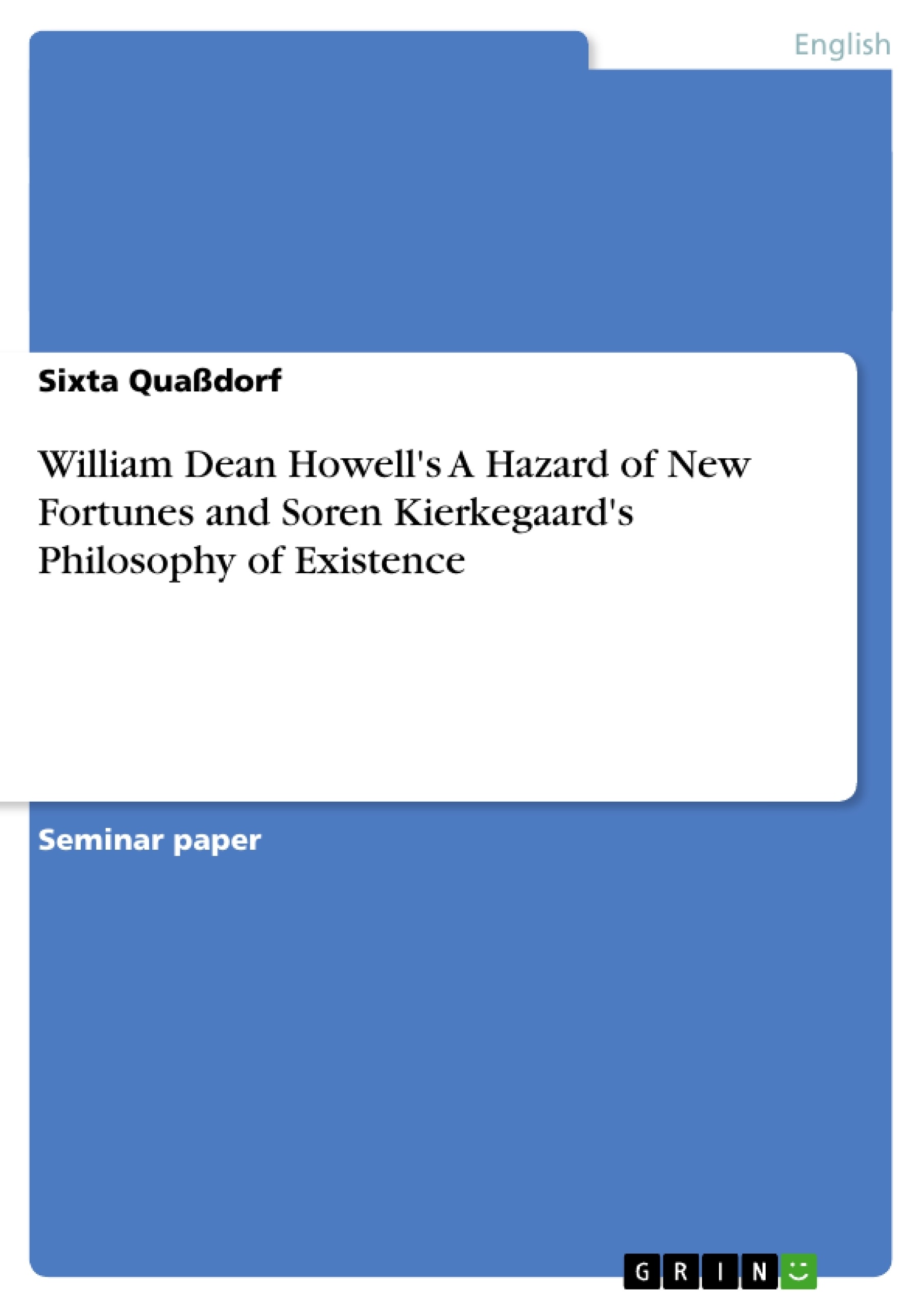In contrast to the writings by his contemporary Henry James, Howells's A Hazard of New
Fortunes can surely not be called a "difficult" read. The socio-critical message seems obvious,
the sequence of events is almost linear and easy to follow, and the characters act in a
sufficiently comprehensible way. Yet as it often happens, more subtle implications become
apparent when the novel is given some deeper thought. One just has to begin to ask questions
like 'why do we have such a multitude of characters?' or 'why is this or that statement put into
irony?', and one will discover an intrinsic network of interrelated meaning on a number of
different levels.
Ironically enough, Howells seems to give himself some of the reasons for a certain
underestimation of his literature. He sees that an art which prefers "the common, the simple
and the unpretentious" contradicts the aesthetic demands of a sophisticated readership, and so
does a strong ethical concern. In A Hazard Howells makes March explain, for example, that if
he wrote "those things with an ethical intention explicitly in mind, [he] should spoil them"
(129). Furthermore strong ethical opinions are met with a lack of understanding. Ethical
convictions do not seem to fit into modern times and appear either old-fashioned, antiaesthetic
or both.
Whilst Howells explores the question of ethics, responsibility and agency through the
carful description of people's problems, thoughts and doings - faithful to his maxim that
"realism is nothing more and nothing less than the truthful treatment of material" (1993, Vol
II: 319) - a Danish philosopher, Søren Kierkegaard, developed a system of modes of human
existence to the same purpose half a century earlier. Like Howells, he started from a faithful
description and analysis of human character. [...]
Inhaltsverzeichnis (Table of Contents)
- Howells's A Hazard of New Fortunes and Kierkegaard's Philosophy of Existence
- Kierkegaard's Modes of Existence
- The Characters in A Hazard
- March
- Lindau
- Fulkerson
Zielsetzung und Themenschwerpunkte (Objectives and Key Themes)
This paper examines the relationship between William Dean Howells's A Hazard of New Fortunes and Søren Kierkegaard's philosophy of existence. It explores how Kierkegaard's modes of existence can provide a deeper understanding of the characters and themes in Howells's novel. This analysis sheds light on the challenges of navigating a rapidly changing society and the complexities of individual agency and responsibility.
- The impact of modernity on the individual
- The nature of ethical and religious existence
- The role of choice and responsibility in shaping individual identity
- The influence of capitalism on human relationships and values
- The importance of subjective perspective and indirect communication in literature
Zusammenfassung der Kapitel (Chapter Summaries)
The paper begins by establishing the context for its analysis, highlighting the similarities between Howells's portrayal of Gilded Age America and Kierkegaard's exploration of "Golden Age Denmark." The paper then delves into Kierkegaard's theory of modes of existence, explaining the concepts of aesthetic, ethical, and religious existence and their respective implications for individual development.
The analysis then turns to Howells's A Hazard of New Fortunes, focusing on three major characters: March, Lindau, and Fulkerson. The paper examines each character's motivations, actions, and relationships in light of Kierkegaard's theory, suggesting how each character embodies different aspects of the aesthetic mode of existence.
Schlüsselwörter (Keywords)
The primary keywords for this paper are: William Dean Howells, A Hazard of New Fortunes, Søren Kierkegaard, modes of existence, aesthetics, ethics, religion, capitalism, modernity, individual agency, subjective perspective, indirect communication.
Frequently Asked Questions
How does Kierkegaard's philosophy relate to William Dean Howells's novel?
The paper uses Kierkegaard's theory of "modes of existence" (aesthetic, ethical, and religious) to analyze the character development and moral dilemmas in Howells's "A Hazard of New Fortunes."
What are Kierkegaard's three modes of existence?
Kierkegaard defines human existence through the aesthetic stage (focused on pleasure and the moment), the ethical stage (focused on duty and social norms), and the religious stage (focused on an individual relationship with the divine).
Which characters in 'A Hazard of New Fortunes' are analyzed?
The analysis focuses on the characters March, Lindau, and Fulkerson, examining how their motivations and actions align with different existential modes.
What is the significance of the Gilded Age setting in the novel?
The setting reflects the impact of rapid modernization and capitalism on individual values and social responsibility, mirroring the tensions Kierkegaard observed in his own era.
How does Howells treat ethics in his literary realism?
Howells believed in the "truthful treatment of material." He explored ethical concerns indirectly through realistic character studies rather than explicit moralizing, which can be compared to Kierkegaard's "indirect communication."
- Citar trabajo
- Sixta Quaßdorf (Autor), 2002, William Dean Howell's A Hazard of New Fortunes and Soren Kierkegaard's Philosophy of Existence, Múnich, GRIN Verlag, https://www.grin.com/document/17505



